Brazilian housing market is recovering
A recovery of Brazil´s housing market is underway in 2019. This is evident in a strong launches and sales in 2018, as well as the positive economic outlook for this year. Mortgage lending also surged in 2018 due to low interest rates and increased consumer confidence.
For the first time since July 2017, nominal house prices were up, as Brazil´s FIPEZAP house price index slightly rose by 0.07% during the year to February 2019. But as we often remind readers, nominal house prices are not ´real´, and house prices fell by 3.68% when adjusted for inflation.
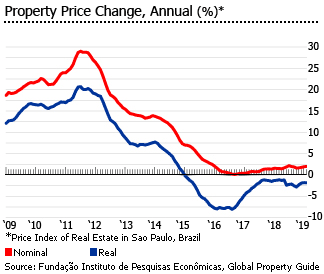
During the year to February 2019:
- In Sao Paulo, Brazil´s biggest real estate market, house prices went up by an average of 2.02%. However, when adjusted for inflation, prices were actually down by 1.8%.
- In Rio de Janeiro, house prices fell by almost 3% (-6.62% inflation-adjusted), its fourth consecutive year of y-o-y nominal price declines.
Real estate agents, as well as analysts from related sectors, mostly expect a better performance from the real estate sector this year.
"Our expectations are very positive for the Brazilian property market as a whole," said Lopes Immobilis´ agent Ricardo Bezerra.
A new real estate cycle is beginning, now that uncertainties have been reduced by the elections, says Eduardo Fischer Teixeira de Souza, MRV president of Engenharia.
"In this sector, we must always try to anticipate the next three years. Even in 2014, when unemployment was low, it was already apparent that there would be difficult years ahead, but 2019 should be better for the real estate market. The worst of the crisis seems to have passed and the demand for housing is high," said Fischer Teixeira de Souza in an interview with the newspaper O Estado de S. Paulo.
"Construction GDP is negative but recovering. The indicators are far from the peak, but many return to the levels before the market boom, which is a sign of improvement," says Brazilian Association of Real Estate Loans and Savings Companies (ABECIP) President Gilberto Duarte de Abreu Filho.
The amazing Lula housing boom
During the boom house prices in São Paulo rose by an amazing 223.8% from January 2008 to June 2015 (106.3% inflation-adjusted), and in Rio de Janeiro by an even more spectacular 266.1% (133.3% inflation-adjusted).
In 2014, nominal house prices started to grow in single digits, ending the year with a 6.7% growth (0.3% inflation-adjusted). Since 2015 national house prices have been falling in real terms.
Property had by then become increasingly unaffordable due to the surge in house prices, leading many Brazilians to rent rather than own. "In the major cities young professionals are struggling to afford the kind of prices now being asked for properties in good areas," according to Colordarcy.
This house price boom was hardly a "bubble". "A bubble means a lot of increases in prices for nothing," says professor Fabio Gallo. This was not the situation in Brazil. "You had real reasons for the expansion of the prices in Brazil."
The 2007 discovery of enormous oil fields deep beneath a layer of salt in the Atlantic seabed boosted the energy industry´s demand for residential and office space. Demand continued to surge following the 2009 announcement that Rio de Janeiro would host the 2016 Olympic Games.
Rapid development of the mortgage market followed legal reforms to streamline the foreclosure process. Plus, interest rates were progressively cut from 26% to 7.25% between 2003 and 2012. The rapid growth of the middle class was another important factor. All of these elements contributed to the house price boom.
The crisis and its aftermath; Bolsonaro succeeds Temer
Brazil´s recent troubles began with the global recession in 2008. To boost the economy, the Central Bank of Brazil slashed the benchmark SELIC rate from 13.75% in December 2008 to 8.75% by July 2009.
Brazil was swamped with consumer credit, and there was a surge in inflation. Even so GDP growth fell to 1.9% in 2012, 3% in 2013, and 0.5% in 2014.
In June 2013 riots exploded, precipitated by a BRL0.20 (USD0.10) rise in public transport fares, and complaints about excessive spending on mega-sporting events. Brazil is not a poor country. But tax rates are extremely high, yet many Brazilians spend up to four hours per day in traffic jams, either in their cars or on crowded public transport. The protests were an outburst of popular frustration at corruption - a protest against an intolerable situation.
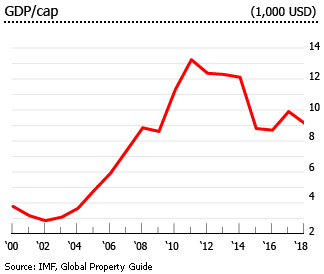
Alarmed at the inflation the central bank raised the benchmark interest rate nine times from 7.25% in March 2013 to 14.25% in 2015, the highest level for almost six years.
GDP per capita fell 31.1% between 2011 and 2018, to US$9,126, according to the IMF. In 2018, nationwide unemployment remains high at 12.3% in 2018, although slightly down from 12.7% in the previous year, with about 12.8 million people unemployed according to IBGE.
Then came the corruption scandal involving oil giant Petrobras and the country´s largest engineering and construction firms. The investigation has implicated politicians, mostly from President Rousseff´s Workers´ Party.
Protests in the streets escalated, worsening the country´s already ailing economy. The impeachment of Rousseff began in December 2015. In August 2016 Rousseff was removed from office and Michel Temer was sworn in as Brazil´s new president.
Michel Temer implemented painful reform measures to attract foreign investment and buoy economic growth. Temer´s reforms include trimming pension benefits, and privatizations of state operations from airports to sewage treatment. In December 2016, the senate approved a constitutional amendment, which imposes a cap on public spending for the next 20 years, adjusted annually for inflation.
Corruption controversies swirling around Temer led him to become even more unpopular. His government received a 3.4% approval rating in September 2017 in a survey conducted by polling firm MDA, down from 10.3% in a poll held in February 2017. After his term of office ended in December 2018, Temer was arrested in March 2019 on corruption and money laundering charges.
The general election of October 2018 was won by far-right candidate Jair Bolsonaro with a 55% share of total votes during the second round, beating Worker´s Party´s (PT) candidate Fernando Haddad, who got a 45% share. Bolonaro was sworn into office on January 1, 2019.
Bolsonaro supports privatization of public-owned enterprises, public spending cuts and lower taxes, but has very worrying anti-environmentalist and anti-human rights views.
Variation of house prices in different regions
During the year to Febuary 2019 Goiânia saw the highest nominal house price rise out of 16 large towns at 4.04% (0.14% inflation-adjusted) followed by Vitória (3.02%), Curitiba (2.05%), Florianópolis (2.12%), and São Paulo (2.02%).
Maceió saw the sharpest house price decline of 5.38%, followed by Rio de Janeiro (-2.99%), Manaus (2.28%), Porto Alegre (-1.46%), Fortaleza (-1.35%), Recife (-0.74%), João Pessoa (-0.67%), and Belo Horizonte (-0.11%).
Apart from Goiânia, all other capitals in FIPEZAP´s house price index saw falling house prices when adjusted for inflation during the year to February 2019.
HOUSE PRICE CHANGE (%) |
|||
| 2012 – 2017 | 2018 (y-o-y) | Feb 2019 (y-o-y) | |
| FipeZap HPI | 23.02 | -0.21 | 0.07 |
| São Paulo | 27.60 | 1.79 | 2.02 |
| Rio de Janeiro | 14.37 | -3.59 | -2.99 |
| Belo Horizonte | 30.56 | -0.23 | -0.11 |
| Brasília | -1.62 | -0.86 | 0.83 |
| Salvador | 23.34 | 0.42 | 0.09 |
| Fortaleza | 27.30 | -2.25 | -1.35 |
| Porto Alegre | 26.28 | -1.16 | -1.46 |
| Curitiba | 48.84 | 3.39 | 2.50 |
| Florianópolis | 44.90 | 1.10 | 2.12 |
| Vitória | 45.50 | 2.46 | 3.02 |
| Goiânia | - | 2.50 | 4.04 |
| João Pessoa | - | - | -0.67 |
| Campo Grande | - | - | 0.04 |
| Maceió | - | - | -5.38 |
| Manaus | - | - | -2.28 |
| Recife | 20.80 | 0.14 | -0.74 |
| Source: FIPE | |||
Real estate sales and launches went up in 2018
Recent sales figures, and the increased number of launches, bolster the case for a strong recovery.
Cyrela Brazil Realty SA, one of Brazil´s largest developers, reported in Q4 2018 that the number of units launched in Q4 2018 rose by 71.5% from the previous year. Likewise, the number of units sold went up by 38.5%.
Housing sales in the city of São Paulo were up by 26.7% in 2018, according to the December 2018 Real Estate Market Research of the Sao Paulo State Housing Union (Secovi-SP). The number of new units launched increased by 4.4% to 32,762 units in 2018.
"We believe that 2019 will be a very healthy year," said Secovi-SP President Basilio Jafet.
BCB keeps benchmark rate at record low
Banco Central do Brasil´s (BCB) Monetary Policy Committee decided to keep the Selic rate at its historic-low of 6.5% in its March 2019 meeting - the lowest Selic rate ever, stable since March 2018, made possible by continued below-target inflation.
The BCB began its current easing cycle towards the end of 2016. The Selic rate was reduced to 14% in October 2016. Eleven more rate cuts were made until it reached 6.5% in March 2018.
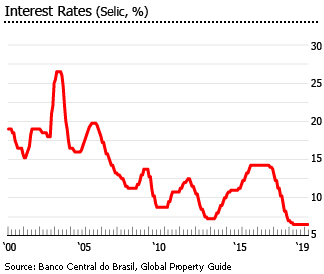
These low rates are likely to have a significant effect. Brazil´s original housing boom was mainly propelled by a decline in interest rates, as successful economic reforms under President Lula da Silva pushed Brazil´s central bank benchmark rate from nearly 30% in 1998, to 8.65% in August 2009.
Real estate credit heading upwards
Loans for real estate acquisition and construction rose by 33% in 2018 to BRL 57.4 billion (US$ 14.95 billion), according to the Brazilian Association of Real Estate Loans and Savings Companies (ABECIP).
Pro-market reforms under former President Lula da Silva greatly helped boost mortgage lending, which rose by at least 25% per year between 2007 and 2014.
The first big breakthrough was the introduction of fiduciary alienation, whereby the buyer becomes the owner of the property only after it has been fully paid. This gives banks security if buyers default (in the past, banks were reluctant to lend, because Brazilian courts are biased in favour of borrowers).
In 2015, mortgage lending slowed sharply, and in 2016 the ABECIP saw a 38.3% y-o-y decline. The decline continued in 2017, with the real estate credit falling by 7.4% y-o-y to BRL 43.15 billion (US$ 11.24 billion).
Outstanding home loans still represent only 8.5% of gross domestic product, or the equivalent of 14% of outstanding bank credit, according to Reuters.
ABECIP president Gilberto Duarte expects stronger demand in the residential construction industry this year (2019). "As seen in 2018, the market should grow, with more launches, and greater demand for credit," according to Duarte.
Rental yields are low to moderate
Gross rental yields - what you can earn from an apartment before tax and other expenses - have continued to move down in Brazil´s big cities, and in most parts of Sao Paolo and Rio de Janeiro being a landlord generates a much less attractive return-on-investment than a few years ago.
In Rio de Janeiro, yields are quite low, ranging from 2.98% to 3.79%. In Sao Paolo, apartment yields are rather higher, between 4.67% and 6.05%, based on the Global Property Guide research in December 2018.
Economic recovery continues; positive outlook in 2019
The Brazilian economy continued to recover for a second year, expanding by 1.1% in 2018, according to the Instituto Brasileiro de Geografia e Estatistica (IBGE).
Growth was mainly supported by household consumption (up by 1.9% y-o-y in 2018), driven by higher real wages and increased household credit, according to the Banco Central do Brasil (BCB).
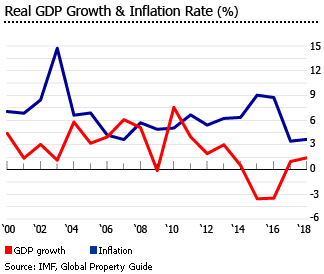
The BCB forecasts 2% growth for 2019, and predicts 2.8% growth in 2020.
"The recent evolution of consumers and entrepreneurs confidence indicators and the improvement in financial conditions, highlighted by the trajectory of market indicators, continue to signal a favorable environment to the continuity of the economic recovery cycle," the central bank noted.
Brazil´s annual inflation rate rose to 4.58% in March 2019, an increase from 3.9% in the previous month, higher than the central bank´s 4.25% target for 2019. Based on the central bank´s focus survey, inflation is forecast to be at 3.89% be end of 2019.
Brazilian Real strengthened after 2018 elections
After plunging to a record-low in September 2018, the Brazilian Real (BRL) has showed signs of improvement.
The currency´s depreciation in 2018 was partly due to political uncertainty prior to the October 2018 Presidential Elections, and to international factors that cannot be controlled by the government.
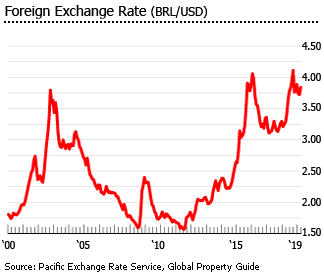
The Brazilian Real opened 2019 with a stronger performance, brought by market optimism over President Jair Bolsonaro´s government and its proposed economic reforms. In April 12, 2019, the exchange rate closed at BRL 3.8802 = US$ 1.
My Home, My Life housing program
The housing program Minha Casa Minha Vida (My House, My Life), launched in March 2009, was one of the popular federal government programs launched during former President Lula da Silva´s 8-year term. Under the program, subsidized mortgage loans were extended to middle and lower income homebuyers through the state-owned bank, Caixa Economica Federal (CEF). By August 2012, one million houses had been built. Former President Dilma Rousseff announced that by 2014 her administration would have contracted 2.4 million houses.
However in mid-2015, construction was paralyzed due to lack of public funds. Then in May 2016, the program was temporarily suspended. In June 2016, it became a target for spending cuts as the country wrestled with ballooning budget deficit and deep recession.
In February 2017, new rules were implemented for Minha Casa Minha Vida program, which could stimulate construction and increase the number of the program´s beneficiaries.
- the maximum income to qualify for the program was increased from BRL 6,500 (US$ 2,031), to BRL 9,000 (US$ 2,813);
- the maximum value of unit that can be availed through the program was increased from BRL 225,000 (US$ 70,319), to BRL 240,000 (US$ 75,007).
Another set of rules was published by the Ministry of Cities towards the end of 2018. The changes were mostly on the subsidy rules of the Minha Casa Minha Vida (MCMV) program.
- Individual subsidies granted in acquiring a house for a family with incomes up to BRL 2,600 (US$ 672.20) will be reduced. This allows the MCMV program to allocate some more funds to the band 2, but at the expense of the band 1.5.
- The monthly family income limit required to receive the maximum subsidy of BRL 47,500 was reduced from BRL 1,600 to BRL 1,200.
- For the monthly income range of around BRL 1,600, the maximum subsidy is now at BRL 29,000.
- Families with only one participant in the financing and without dependents, will only be entitled to 50% of the subsidy of their income range, down from the previous 70% share. This prevents unmarried beneficiaries in getting the same subsidy amount as those families with many children, as well as those financially stable couples in obtaining two allowances.
- From a 100% allocation, companies can now only allocate a maximum of 50% of the properties of a development for the 1.5 range/band. The other half of the development´s properties should be directed to trade in the upper bands.
Income and Interest Rate Bands - My House My Life 2019 |
||
| Property Type | Income Bracket | Interest Rates |
| New (Band 1.5) | up to BRL 2,600 | 5% |
| New or used (Band 2) | up to BRL 2,600 | 5.50% |
| New or used (Band 2) | up to BRL 3,000 | 6% |
| New or used (Band 2) | up to BRL 4,000 | 7% |
| New or used (Band 3) | up to BRL 7,000 | 8.16% |
| Source: Click Habitação (www.clickhabitacao.com.br) | ||
Sources:
- The Institute of Economic Research Foundation (FIPE): https://www.fipe.org.br/pt-br/indices/fipezap/#indice-mensal
- Great Expectations for Brazilian Property Market in 2019 (BRIC Group): http://bric-investment.com/news/great-expectations-for-brazilian-property-market-in-2019/
- ´2019 deve ser um ano melhor para o mercado imobiliário´, diz presidente da MRV (Jornal Estado de Minas): https://www.em.com.br/app/noticia/economia/2019/01/07/internas_economia,1019316/2019-deve-ser-um-ano-melhor-para-o-mercado-imobiliario-diz-presiden.shtml
- Indicadores apontam recuperação do mercado imobiliário (ABECIP): https://www.abecip.org.br/imprensa/abecip-na-midia/indicadores-apontam-recuperacao-do-mercado-imobiliario
- The Most Attractive Market for Property Investors (Colordarcy): https://www.colordarcy.com/wp-content/uploads/2014/08/The-Most-Attractive-Market-For-Property-Investors.pdf
- Slowing economy stalls Brazil’s real estate growth (CGTN America): http://www.cctv-america.com/2015/01/20/slowing-economy-stalls-brazils-real-estate-growth#ixzz3XhCLEfni
- Unemployment falls to 12.3% in the year with a record of persons in informality (IBGE News Agency): https://agenciadenoticias.ibge.gov.br/en/agencia-news/2184-news-agency/news/23658-unemployment-falls-to-12-3-in-the-year-with-a-record-of-persons-in-informality
- Approval rating for Brazil´s Temer plummets: poll (Reuters): https://www.reuters.com/article/us-brazil-politics-poll/approval-rating-for-brazils-temer-plummets-poll-idUSKCN1BU21S
- Far-right candidate Jair Bolsonaro wins presidential election in Brazil (CNN): https://edition.cnn.com/2018/10/28/americas/brazil-election/index.html
- Former Brazil president Michel Temer arrested on corruption charges (The Washington Post): https://www.washingtonpost.com/world/the_americas/former-brazil-president-michel-temer-arrested-on-corruption-charges/2019/03/21/74e9a92a-4be7-11e9-8cfc-2c5d0999c21e_story.html?utm_term=.aaa9356366f9
- Brazil elected far-right populist Jair Bolsonaro, and the markets love it (Quartz): https://qz.com/1441430/jair-bolsonaros-election-in-brazil-is-pushing-markets-higher/
- How Bolsonaro´s Election Impacts Brazil´s Economy (Seeking Alpha): https://seekingalpha.com/article/4225025-bolsonaros-election-impacts-brazils-economy
- Venda de imóveis cresce 27% na cidade de São Paulo em 2018, diz Secovi-SP (Universo Online (UOL)): https://economia.uol.com.br/noticias/estadao-conteudo/2019/02/20/venda-de-imoveis-cresce-27-na-cidade-de-sao-paulo-em-2018-diz-secovi-sp.htm
- Cyrela Reports Cash Generation of R$ 137 Million in 4Q18 and R$ 803 Million in 2018. - Cyrela Earnings Release Q4 2018 (Cyrela): https://cyrela.globalri.com.br/upload/files/3104_Cyrela-Earnings-Release_4Q18_EN.PDF
- Mercado imobiliário de São Paulo apresenta bons resultados em dezembro de 2018 (Secovi-SP): http://www.secovi.com.br/downloads/pesquisas-e-indices/pmi/2018/201812-pmi.pdf
- Em SP, vendas de imóveis crescem 36,5% em novembro (AECweb): https://www.aecweb.com.br/cont/n/em-sp-vendas-de-imoveis-crescem-365-em-novembro_18342
- Minutes of the 221st Meeting of the Monetary Policy Committee (Copom)* of the Banco Central do Brasil (Banco Central do Brasil (BCB)): https://www.bcb.gov.br/htms/copom_en/min20190320221.pdf
- Brazil cuts rates for first time in four years to bolster recovery (Reuters): https://www.reuters.com/article/us-brazil-economy-rates/brazil-cuts-rates-for-first-time-in-four-years-to-bolster-recovery-idUSKCN12J28L
- Brazil: New COPOM keeps monetary policy unchanged (Focus Economics): https://www.focus-economics.com/countries/brazil/news/monetary-policy/new-copom-keeps-monetary-policy-unchanged
- Brazil Central Bank cuts interest rate to 6.5% a year (Agencia Brasil): http://agenciabrasil.ebc.com.br/en/economia/noticia/2018-03/brazil-central-bank-cuts-interest-rate-65-year
- Brazil cuts benchmark interest rate to record low of 6.5 pct (Xinhuanet): http://www.xinhuanet.com/english/2018-03/22/c_137057112.htm
- Classe média reaquece mercado imobiliário (Jornal Estado de Minas): https://www.em.com.br/app/noticia/economia/2019/02/20/internas_economia,1032026/classe-media-reaquece-mercado-imobiliario.shtml
- Mortgage slack poses more headwinds for Brazilian banks (Reuters): http://www.reuters.com/article/2015/01/22/us-banks-brazil-mortgages-analysis-idUSKBN0KV21920150122
- Crédito imobiliário tem virada promissora em dezembro (ABECIP): https://www.abecip.org.br/imprensa/abecip-na-midia/credito-imobiliario-tem-virada-promissora-em-dezembro
- Crédito imobiliário atinge o montante de R$ 3,68 bilhões em dezembro (ABECIP): https://www.abecip.org.br/download?file=data-abecip-jan20181.pdf
- Financiamentos imobiliários somam R$ 6,05 bilhões em dezembro, melhor resultado em 44 meses (ABECIP): https://www.abecip.org.br/download?file=data-abecip-2018-12.pdf
- Crédito imobiliário (SBPE e FGTS) fecha 2018 em R$ 117 bilhões, diz Abecip (Universo Online (UOL)): https://economia.uol.com.br/noticias/estadao-conteudo/2019/01/30/credito-imobiliario-sbpe-e-fgts-fecha-2018-em-r-117-bilhoes-diz-abecip.htm
- Instituto Brasileiro de Geografia e Estatistica (IBGE): https://www.ibge.gov.br/en/home-eng.html
- Inflation Report March 2019 (Banco Central do Brasil (BCB)): https://www.bcb.gov.br/htms/relinf/ing/2019/03/ri201903I.pdf
- Brazilian Real Reaches Lowest Level Against US Dollar Since 1994 (The Rio Times): https://riotimesonline.com/brazil-news/rio-business/brazilian-real-reaches-lowest-level-against-us-dollar-since-1994/
- Brazilian real closes at record low (Xinhuanet): http://www.xinhuanet.com/english/2018-09/14/c_137467198.htm
- Real surges on reform optimism (Focus Economics): https://www.focus-economics.com/country-indicator/brazil/exchange-rate
- Brazil FX: What’s driving the BRL’s underperformance? (Euromoney): https://www.euromoney.com/article/b17xbbclfrs6bp/brazil-fx-whats-driving-the-brls-underperformance
- Minha Casa Minha Vida Housing Program to Expand in Brazil (The Rio Times): http://riotimesonline.com/brazil-news/rio-business/brazil-to-expand-minha-casa-vida-minha-housing-program/
- Governo muda regras de subsídio para programa Minha Casa, Minha Vida (AECweb): https://www.aecweb.com.br/cont/n/governo-muda-regras-de-subsidio-para-programa-minha-casa-minha-vida_18327
- O que mudou no Minha Casa Minha Vida 2019? (Click Habitação): https://www.clickhabitacao.com.br/artigos/o-que-mudou-no-minha-casa-minha-vida-2019/